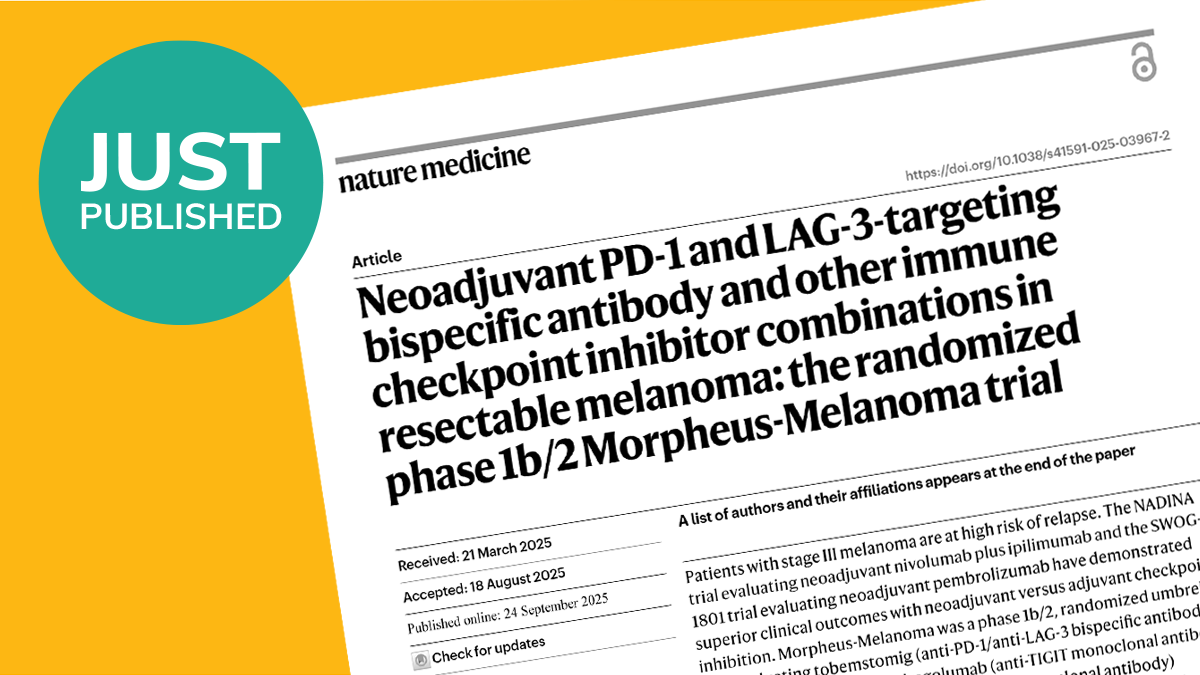New clinical tool developed by Melanoma Institute Australia hailed a breakthrough in personalising treatment for all cancer patients.
In a world-first which could transform cancer treatment globally, oncologists now have access to an online tool to more accurately determine if their patients will respond to immunotherapy before starting treatment.
The Immunotherapy Outcomes Prediction calculator, developed by researchers at Melanoma Institute Australia and validated using data from more than 1,500 patients from Australia, Europe and the US, will help guide treatment decision making and ultimately lead to a more personalised medicine approach.
‘There is a tremendous need to accurately identify which melanoma patients are likely to benefit from immunotherapy, prior to starting them on treatment,’ said senior study author and Medical Oncologist, Associate Professor Alexander Menzies from Melanoma Institute Australia and The University of Sydney.
‘This new online calculator will help identify which patients are likely to benefit, but equally importantly, those who are unlikely to benefit. This will allow us to, from the outset, utilise other treatments for these patients like novel treatments only available via clinical trials. Removing the one size fits all approach to treatment will improve outcomes and ultimately save lives.’
Immunotherapy, which harnesses the body’s own immune system to fight the cancer cells, has transformed patient outcomes over the last decade. Survival rates for advanced melanoma have gone from less than 5%, to now more than 50%. However, a large subset of advanced melanoma patients either don’t respond to, or become resistant to, this immunotherapy treatment.
Melanoma Institute Australia led an international collaboration collecting data on immunotherapy outcome. Determining the correlation between pretreatment clinical factors and patient response was critical, with results recently published in the prestigious Journal of Clinical Oncology.
The data was then transformed by MIA into the Immunotherapy Outcomes Prediction calculator, to accurately forecast clinical outcomes for patients treated with checkpoint inhibitor immunotherapy (nivolumab or combination ipilimumab and nivolumab).
‘Using routinely collected clinical factors available at consultation – like blood parameters and site of metastases – to better profile the likelihood of response to treatment makes this tool highly accessible to oncologists and useful in directing treatment,’ said Dr Ines Pires da Silva, lead study author and Medical Oncologist, Melanoma Institute Australia and The University of Sydney.
The new Immunotherapy Outcomes Prediction calculator joins a suite of MIA online prediction tools available for clinicians worldwide at melanomarisk.org.au.
‘This new online calculator is just one part of our overall goal towards personalised medicine,’ said Professor Georgina Long AO, study author and Co-Medical Director of Melanoma Institute Australia, and The University of Sydney.
‘Using routine clinical factors to profile patients and determine best treatment is critical, but it is just the first step. Our Personalised Immunotherapy Platform, which uses individual tumour biomarkers in combination with clinical factors to predict resistance to current treatment and identify alternative treatment, is the next step.’
‘We are taking the concept of personalised medicine to another level, which has the potential to transform treatment of all cancers,’ added Professor Richard Scolyer AO, study author and Co-Medical Director of Melanoma Institute Australia, and The University of Sydney.
‘Providing the right treatment to the right person at the right time will not only save lives, but it will also reduce the physical, emotional and financial costs of a patient having to go through several treatments with no certainty they will work,’ he said.
Publication: Pires da Silva I, Ahmed T, McQuade JL, et al. Clinical Models to Define Response and Survival With Anti-PD-1 Antibodies Alone or Combined With Ipilimumab in Metastatic Melanoma. J Clin Oncol. (Epub Feb 2022).





